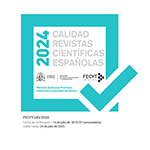La formación profesional como política pública de estabilidad
Abstract
Beginning with the concept of governability, and of the different levels of governance, educational policy is considered to constitute the key stone on which democratic political systems of countries with developed and industrialized societies maintain, stabilize and empower themselves. And it is precisely from the growing levels of training of the citizens in these countries where said societies and States move toward some degrees of economic prosperity and social peace that, taken as a whole, permit the consoli- dation, stabilization and democratization of the systems. With that, this work seeks to move closer to the study of educational policy, specifically, through regulated and unregulated training paths. The thesis used in this report rests on the recognition of the determinant importance which educational policy has on the governability and participatory democratic strengthening of a political system, shaping itself as the strategic factor of public action. The progress of a country and its levels of economic development and social wellbeing are going to depend decisively and ultimately on how the variable named human capital is managed. A series of recommendations and guidelines which influence the improvement of those factors which aid good governance may be derived from an analysis of educational policy. This study will tackle the change of the paradigm experienced in said policy, which at the same time must frame itself in the theoretical concept of Sozialstaat and in the later evolution and crisis of the Welfare State.Downloads
Article download
License
In order to support the global exchange of knowledge, the journal Cuadernos de Trabajo Social is allowing unrestricted access to its content as from its publication in this electronic edition, and as such it is an open-access journal. The originals published in this journal are the property of the Complutense University of Madrid and any reproduction thereof in full or in part must cite the source. All content is distributed under a Creative Commons Attribution 4.0 use and distribution licence (CC BY 4.0). This circumstance must be expressly stated in these terms where necessary. You can view the summary and the complete legal text of the licence.









